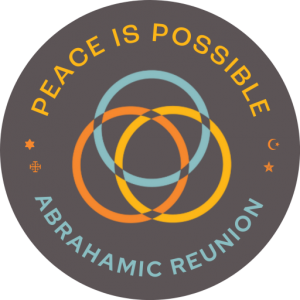At the end of July, Sheikh Ghassan Manasra and Katie Emmons, along with Karen Keenan of the Sufi Order of Rochester, attended the annual “Sacred Texts and Human Contexts” conference at Nazareth College in Rochester, New York. Running from Sunday, July 29th to Tuesday, July 31st, this year’s theme was “Religions and the (De)Legitimization of Violence.” Sheikh Ghassan was the last keynote speaker of the conference, giving a talk entitled “Religion as a Force for Peace” to a group of about 60 people.
In his talk, Sheikh Ghassan discussed the meaning of the phrase “Religion as a force for peace” in the Abrahamic Reunion. He explained that “We didn’t say Islam, Judaism, Christianity, or other religions as a force for peace. We say “religion” as a force for peace. Because other people, they say their religion is different than yours,” and that is okay. They can still “come to be a part of our process. Come to be a part of our work. Come to be a part of us.”
He explained that religion is one of the main sources of the conflict, and it has created fear between people. “But,” he said, “at the same place of the conflict, you will find the solution. I think the solution will be at the same place as the challenge, or the problem.” So religion must be the source of the solution as well.
Ghassan ended with a story about his daughter when she was a young girl. The two of them went to an event together, where she played with Ghassan’s friend’s daughter. Afterwards, Ghassan asked her if she enjoyed herself, and she responded that she did and made a new friend. Ghassan asked her what language they spoke in, and she replied “We spoke in Arabic.”
Ghassan then called his friend and asked him to ask his daughter the same thing. The friend’s daughter said she also had fun, and responded that “I spoke in Hebrew.” Ghassan said that seeing those two young girls understand each other and connect without a shared language “makes me a different person.” It inspired him to write an article titled “Some Dialogues Don’t Need Language.”
He closed with advice for everyone: “If you need to create a dialogue, go to your mentors, to your teachers, and to your children. Youth: they can create great dialogue… The simple things create dialogue.”




